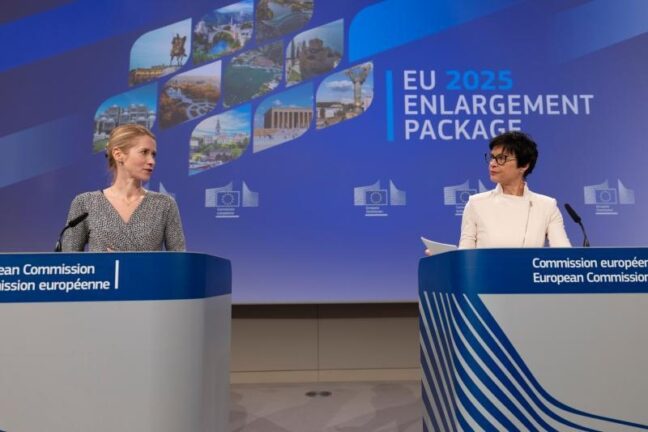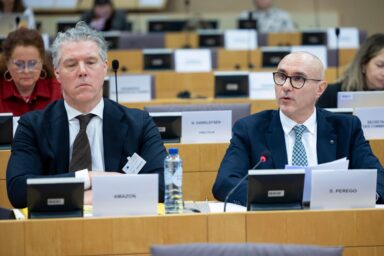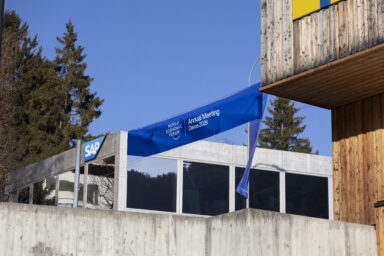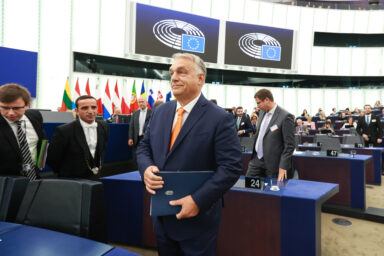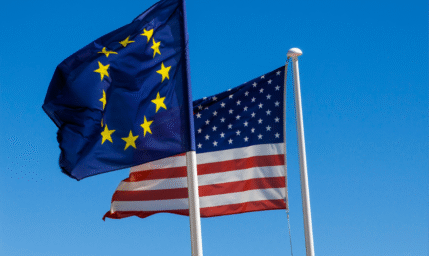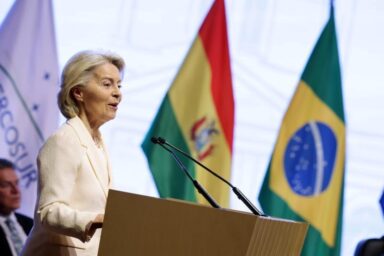With geopolitics in the driver’s seat, the European Commission has delivered its annual Enlargement Package. The 2025 report states that the accession of fresh members is increasingly more realistic and that momentum sits ‘high on the priority agenda’ of the Union.
Ursula von der Leyen, the Commission’s president, framed the stakes in the Tuesday, 4 November statement: “We are more committed than ever to turning EU enlargement into a reality. Because a larger Union means a stronger and more influential Europe on the global stage.”
Foreign-affairs chief Kaja Kallas drove the same point home at Tuesday’s press conference. “Enlargement is not nice to have, it is a necessity if we want to be a stronger player on the world stage,” she said. Ms Kallas listed the leaders of the pack: “The scorecards are largely positive for Albania, Moldova, Montenegro, and Ukraine.” Lagging candidates, she warned, “must accelerate if they want to stay in the race.”
Merit remains the organising principle. “EU accession is a unique offer. A promise of peace, prosperity and solidarity,” Ms von der Leyen’s statement proclaims. “With the right reforms and a strong political will, our partners can seize this opportunity.” Ms Kallas echoed the stick that accompanies the carrot: “The outlook is mixed for Serbia, North Macedonia, Kosovo, Bosnia-Herzegovina, and Turkey, and negative for Georgia.”
You might be interested
Front-runners set the pace
Montenegro tops the class. Over the past year it has provisionally closed four negotiation chapters and hopes to finish talks by end-2026. The Commission applauds the zeal but urges continuity. “Maintaining steady reform progress and seeking broad political consensus are crucial,” the document says. Albania enjoys similar momentum. Four clusters have opened and the fifth is nearly ready. Ms Kallas called the trajectory “unprecedented”.
Enlargement commissioner Marta Kos sounded equally upbeat. “A successful enlargement is a realistic possibility within the coming years, and I cannot tell you how happy I am to be able to announce this,” she told reporters. “Our candidates have ambitious goals. Montenegro wants to finish negotiations at the end of 26, Albania at the end of 27, Moldova and Ukraine in 2028.” Yet she warned against complacency: “Ambitions are more important than years, and the Commission is supporting those ambitions.”
Dear government of Georgia, you are not bringing your people to the EU. You are bringing your people away from the EU. — Marta Kos, EU Enlargement Commissioner
Ms Kos also quashed talk that some new members (Tirana was mentioned) might enter the club with curtailed rights. “There is no debate on cutting the voting rights,” she said. On Albania’s maritime dispute with Greece she was sanguine. “Until now, Albania has been able to come close to solve the bilateral issues… and I am optimistic that this will be the same in the future.”
War-time reformers
Ukraine and Moldova have advanced despite grim headwinds. Kyiv has completed screening and met conditions to open nine clusters. Ms Kallas praised that feat: “No candidate country has ever implemented such sweeping reforms while at war.” Moldova, buoyed by an election in October that confirmed its pro-EU majority, stands at the same stage. Ms Kos urged parallel progress. “We should move on with both of those countries… because, as we say, it’s a merit-based process.”
Formal blessings now depend on member states. Still, Brussels intends to keep technical work humming even before clusters open. “Yes, indeed, we need a formal opening of clusters for Moldova and Ukraine. On the other hand, we can work… on the reforms also without this,” Ms Kos explained. Ms Kallas added a security dimension: “For Ukraine, membership in the European Union can be a major security guarantee.”
A journalist asked whether Transnistria blocks Chişinău’s bid. Ms Kallas dismissed the concern. “The European Commission respects the territorial integrity of the Republic of Moldova, meaning Transnistria is a part of the country. And I’m sure that before Moldova will become a member of the EU, we will be able to solve this problem.” She cited fresh steps, including the closing of illegal crossings and the rebroadcasting of Moldovan public media in the separatist region.
Mid-field turbulence
Serbia plods along. Polarisation, street protests and what Brussels calls “excessive use of force” have chilled reforms, while alignment with EU foreign policy sits at a mere 60 per cent. Ms Kos set out the arithmetic. “We have 100 percent in the Western Balkans, 99 with Ukraine, 98 with Moldova, and Serbia it’s 60, 61. Serbia will have to decide.” Belgrade must regain trust quickly, the Commissioner said. Progress on a new media regulator and an electoral law, however, gave her hope.
Kosovo’s path also wobbled after inconclusive February elections and a flare-up in the north. EU funding freezes stay in place, but Ms Kos opened the door to relief. “We will lift the measures as soon as possible, especially now after the local elections being running well,” she said, tying further steps to “sustained de-escalation”. She stressed that normalising relations with Serbia forms an “integral part” of Kosovo’s European perspective.
Enlargement is not nice to have, it is a necessity if we want to be a stronger player on the world stage. — Kaja Kallas, EU’s top diplomat
North Macedonia waits on a constitutional amendment to list Bulgarians explicitly. Without it, the first negotiating cluster cannot open. Bosnia and Herzegovina remains hobbled by a crisis in Republika Srpska, though Sarajevo has at least submitted a new Reform Agenda. Ms Kallas described the picture as “mixed” and urged fresh impetus on judicial laws and a chief negotiator.
Back-markers and brakes
Turkey, a candidate since 1999, remains stalled. “The deterioration of democratic standards, judicial independence, and fundamental rights have de facto frozen the enlargement process since 2018,” Ms Kallas said. Dialogue on shared priorities—migration, trade, climate—continues, but accession talks do not budge. Georgia fares worst of the entire pack. Democratic backsliding has “sharply deteriorated” since 2024, prompting Brussels to brand it “a candidate country in name only”.
Ms Kos delivered a blunt verdict. “Dear government of Georgia, you are not bringing your people to the EU. You are bringing your people away from the EU.” She hinted at looming sanctions once member states approve a new visa-suspension tool: “In November we will hopefully get a new visa suspension mechanism, which will enable us to do some further steps.”
The package devotes ample space to information warfare. “Effective communication, as well as countering foreign information manipulation and interference, including disinformation is a strategic imperative,” the text warns. Russia’s invasion sharpened the point. Enlargement, Ms Kallas argued, offers “a geopolitical investment” that strengthens the Union without firing a shot.
Rules of the club
To stop future backsliding, the Commission proposes tougher clauses in accession treaties. “Future Accession Treaties should contain stronger safeguards against backsliding on commitments made during the accession negotiations,” the report notes. An independent audit board will track compliance. Ms Kallas endorsed the approach, saying enlargement should “strengthen our Union, not dilute it.”
Money lubricates the process. Aspiring members draw on grants, loans and early access to parts of the single market through “gradual integration”. Ms Kos promised sustained support but warned that cash alone cannot close chapters. “You can count on our assistance, but there is a lot of work still to be done,” she said, reminding candidates that ratification by 27 legislatures follows any deal.
We expect from a candidate country a clear geopolitical positioning, especially in the times when Russia is killing people in Ukraine. — Marta Kos
Security worries colour every file. A question on Serbia’s links to Moscow drew a sharp reply. “We expect from a candidate country a clear geopolitical positioning, especially in the times when Russia is killing people in Ukraine,” Ms Kos said. Alignment, in her view, serves as both moral test and litmus of reliability.
Crunch season ahead
Member states now scrutinise the Commission’s recommendations. If they concur, formal clusters for Ukraine, Moldova and Montenegro could open before Christmas. North Macedonia may clear its constitutional hurdle; Kosovo could see sanctions lifted; Serbia might gain or lose ground depending on court reforms and media freedom. Georgia faces the opposite risk: new penalties unless it changes course.
Brussels also prepares for its own overhaul. A communication due in spring will lay out institutional tweaks—from voting rules to budget ceilings—so a Union that may top thirty members still functions. Ms Kallas believes the strains are manageable. The alternative, she implied, is strategic shrinkage.
Public opinion remains the wild card. Ms Kos said the Commission “stands ready to support member states’ effort to further anchor public trust in the process,” through transparent audits and clear metrics. She knows enlargement can sour if voters view it as elite hobby-horse rather than security shield.
Long road, clear map, split screen
Candidates must now turn laws into courtroom verdicts, procurement tenders and corruption-free budgets. Montenegro needs cross-party backing to sustain momentum through elections. Albania must prove that new prosecutors can jail big fish, not just small fry. Ukraine has to vet judges while missiles still fall. Moldova must keep oligarchs at bay and iron out its frozen conflict.
The EU faces decisions of its own. It must decide whether to move from unanimity to qualified majority voting in foreign policy, how to fund cohesion for poorer entrants, and whether to cap the next budget before new members arrive. Those debates could prove as fraught as any candidate’s reforms.
We are more committed than ever to turning EU enlargement into a reality. — Ursula von der Leyen, European Commission President
Yet the mood in Brussels feels different from past cycles of enlargement fatigue. Ms Kallas credited geopolitics: “Membership is a security guarantee.” Ms Kos pointed to tangible timetables: “Finishing negotiations until the end of 27 is possible, but there is still a lot to be done.” Both officials argue that the costs of delay—more Russian influence, stalled reforms, lost growth—now outweigh the pains of expansion.
If EU capitals heed the Commission’s advice, 2026 could see the first provisional closures since Croatia joined the bloc. By 2028 Ukraine and Moldova hope to finish talks; Albania might follow. Montenegro could even wrap up first. Further east, Georgia risks slipping off the map, while Turkey’s file gathers dust. The split screen may yet sharpen Europe’s sense of purpose.
